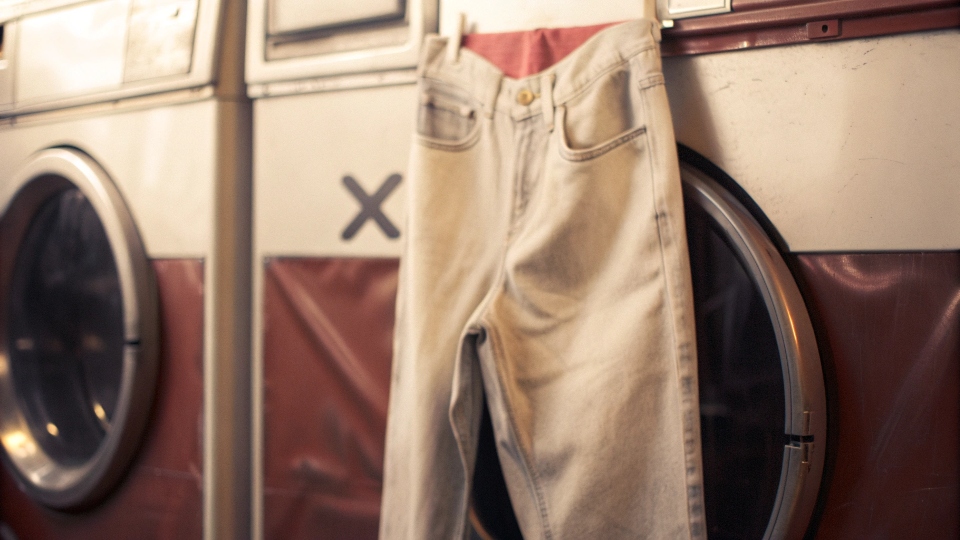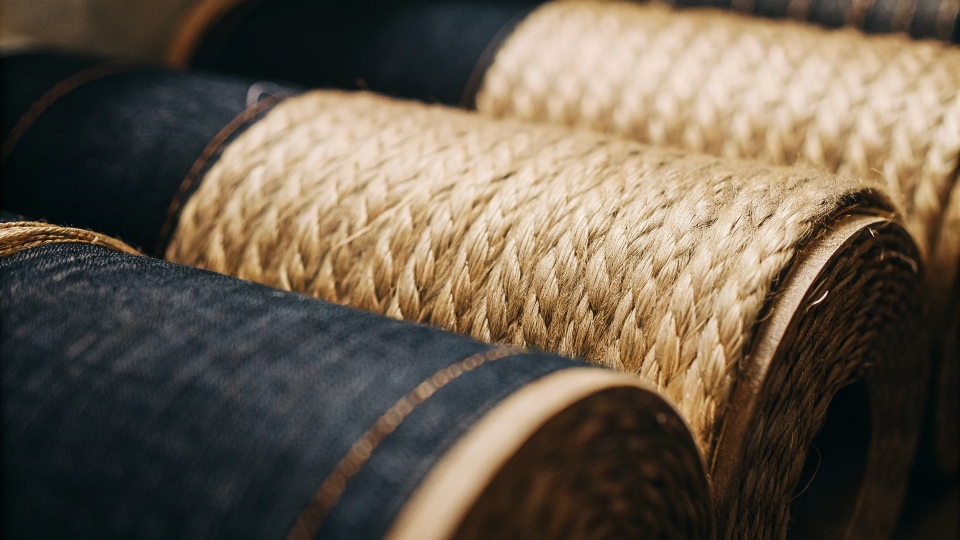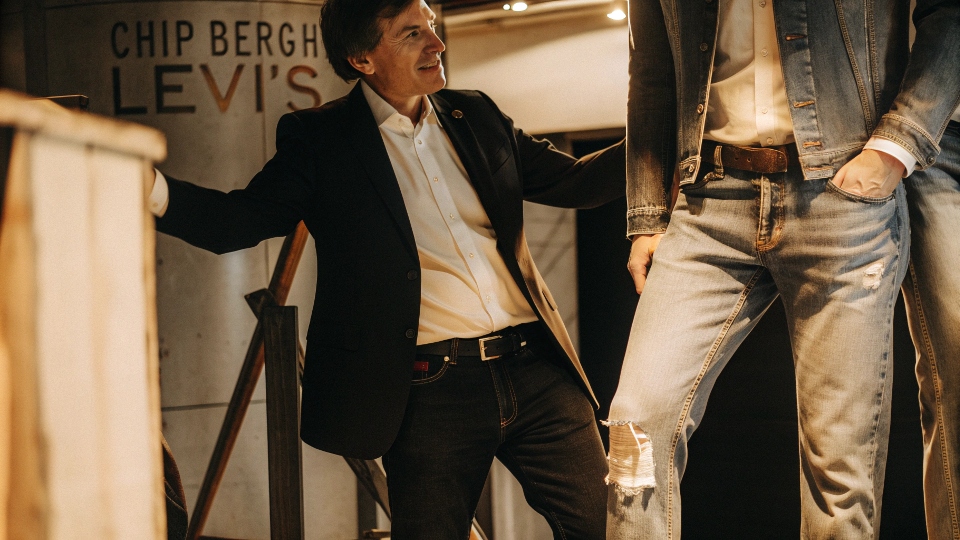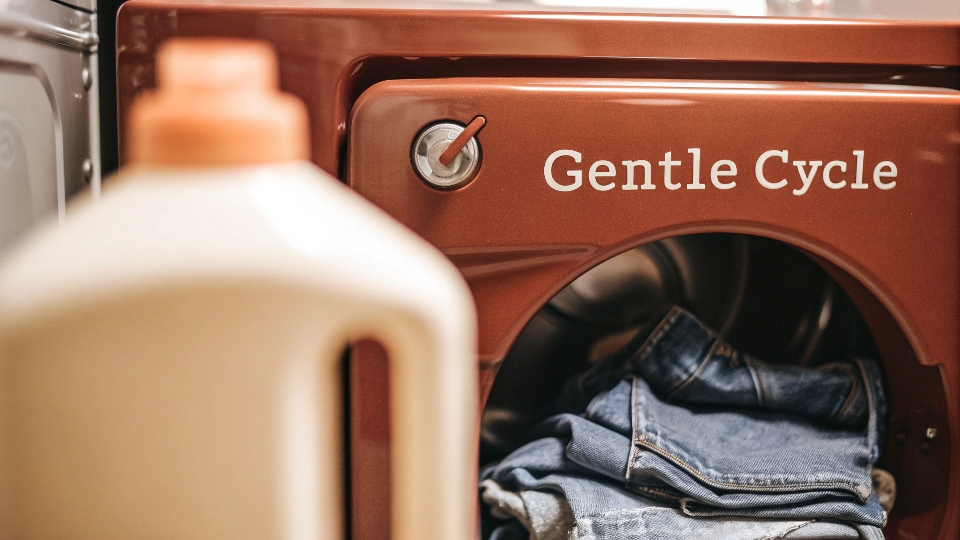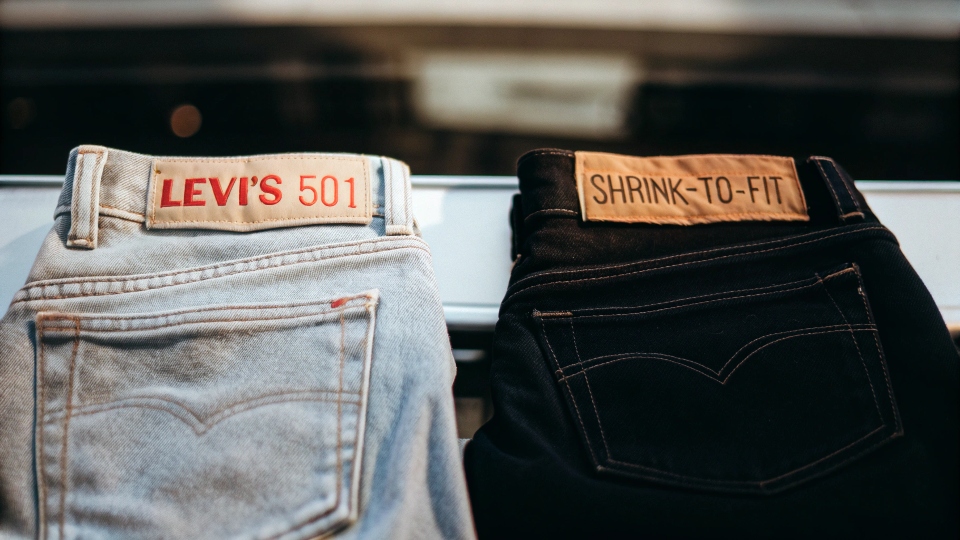You've heard the advice to never wash your jeans, but that sounds unhygienic. You're torn between ruining your favorite pair with a wash and wearing dirty clothes.
The idea that you should never wash jeans is a myth. The real advice is to wash them as infrequently as possible. This preserves the color and fit, especially for raw denim, but you should still wash them when they are genuinely dirty or smell.
This is one of the biggest debates in the denim world. As someone who has manufactured jeans at my factory, DiZNEW, for over 20 years, I can tell you the answer isn't a simple yes or no. For designers like Dean in New York, the way a pair of jeans ages is a critical part of the design itself.
The "no-wash" rule comes from a specific philosophy about achieving that perfect, personal fade. But for everyday life, hygiene1 also matters. The truth is, you don't have to choose between a great-looking pair of jeans and being clean. You just need to understand why people say not to wash them.
Why are you not supposed to wash denim?
You love the deep, rich color of your new jeans. You're afraid that the first wash will strip them of their character, leaving them looking dull and faded.
You are advised not to wash denim frequently to preserve the surface indigo dye2. Washing breaks down this dye, causing color loss and preventing the formation of unique, high-contrast wear patterns like "whiskers" and "honeycombs."
The advice to avoid washing is all about controlling the aging process of the fabric. It comes down to three main technical reasons that we deal with every day in manufacturing.
1. The Nature of Indigo Dye
Unlike other dyes that penetrate deep into the fabric's fibers, indigo dye mostly sits on the surface of the cotton yarns.
It's designed to be impermanent. When you wash your jeans, the combination of water, detergent, and the friction from tumbling physically chips away at this dye. For raw denim enthusiasts3, the goal is to let this chipping happen naturally through wear, not artificially in a machine.
This creates beautiful, personal fade patterns where the fabric creases and rubs. Frequent washing just leads to a flat, uniform blue color instead of a unique patina.
2. The Risk of Shrinkage
Cotton is a natural fiber that shrinks when it gets wet and is exposed to heat. While most modern jeans are "sanforized"—a process we use at the factory to pre-shrink the fabric—they can still shrink a little more. Raw, or un-sanforized, denim can shrink dramatically, up to 10%.
Washing, especially with warm or hot water, can alter the fit of your jeans permanently, making them tighter and shorter than you intended.
3. Maintaining Fabric Integrity
Every wash is a stressful process for the cotton fibers. The aggressive tumbling and chemical detergents can strip the natural oils from the cotton, making the fabric weaker and more prone to tearing over time.
For raw denim specifically, washing removes the starchy finish that gives the jeans their initial stiff, crisp structure. While some people want softer jeans, those who love raw denim want to preserve that rigidity for as long as possible.
Who said not to wash jeans?
You hear this "no-wash" rule thrown around by fashion experts and online forums. You wonder if this is a real piece of expert advice or just a popular myth.
The most famous proponent of not washing jeans is Chip Bergh, the CEO of Levi's. This advice is also a core belief within the raw denim enthusiast community, who prioritize developing personal fade patterns4 over frequent cleaning.
The idea of not washing jeans didn't come out of nowhere. It came from the very top of the denim industry and its most dedicated fans.
The most public example was when Chip Bergh, the CEO of Levi Strauss & Co., famously announced that he hadn't washed his own pair of jeans in over a year.
He spoke about spot-cleaning small stains with a toothbrush instead of doing a full machine wash. This statement from the head of the world's most iconic jeans company gave the idea huge credibility.
His point was that avoiding the washing machine is the best way to maintain the character and integrity of a beloved pair of jeans.
The other major source is the dedicated community of raw denim fans. These are people who might spend hundreds of dollars on a single pair of jeans made from special Japanese selvedge denim. For them, the jeans are a long-term project.
The goal is to wear them for six months, a year, or even longer before the first wash. This allows their body and daily activities to create completely unique patterns in the denim. For this specific group, washing is seen as a "reset" that ruins the progress they have made.
This expert advice for a niche product then got simplified and applied to all jeans, which is where the confusion started.
Do washing machines ruin denim?
You rely on your washing machine for everything. The idea that this essential appliance is secretly destroying your favorite pair of jeans is concerning and makes you question how to do laundry.
A washing machine can ruin denim if you use the wrong settings. Hot water, aggressive spin cycles, and harsh detergents will cause fading, shrinking, and unnecessary stress on the fabric. However, a gentle, cold wash is much safer.
As a factory owner, I can tell you that we use water and machines to finish jeans all the time. The key is total control.
A washing machine is a tool, and like any tool, it can be used correctly or incorrectly. It's not the machine itself that's the problem; it's the heat and friction it can generate. The process of making jeans look "worn" in the factory is called a "stone wash," where we literally tumble them with abrasive stones.
Your home washer can create a less intense version of this effect every time you use it. To avoid ruining your jeans, you need to minimize the three main dangers:
| Damaging Action | Why it's Bad for Denim | The Safe Alternative |
|---|---|---|
| Using Hot Water | Causes cotton fibers to shrink and rapidly accelerates the removal of indigo dye, leading to major fading. | Always use cold water (30°C / 86°F or less). Cold water cleans effectively without damaging the dye or the fit. |
| Aggressive Cycles | The intense tumbling and high-speed spin places stress on seams, stretches the fabric unevenly, and can cause twisting. | Use the gentle or delicates cycle. This mimics a much less aggressive hand wash, protecting the fabric's structure. |
| Using a Hot Dryer | The high, direct heat is the number one cause of significant shrinkage and can set in permanent, ugly creases. | Never use the dryer. Always hang your jeans to air dry. This is the single most important step you can take. |
Are you supposed to wash Levi jeans?
Levi's are the original, classic jeans. With so much conflicting advice, even from the company's CEO, you just want a clear answer on how to care for your 501s.
Yes, you are supposed to wash Levi's jeans5, but how and when depends on the specific type you own. Pre-washed styles can be washed when dirty, while raw "Shrink-to-Fit" models should follow the raw denim care guide.
Saying "Levi's" is like saying "Ford"; they make many different models for different customers. The care instructions are not one-size-fits-all. You need to know which product you have.
For Most Modern Levi's
The vast majority of Levi's you buy today are pre-washed and sanforized. This means we, or a factory like mine, have already washed and treated them to get a specific color and to make them soft. They are designed for easy care. For these jeans, the rules are simple:
- Wash them when they are stained or start to smell.
- Turn them inside out to protect the color.
- Use a cold, gentle cycle in the washing machine.
- Hang them up to air dry.
For Levi's "Shrink-to-Fit6™" 501® Jeans
This is the special case. These are the classic, raw, un-sanforized jeans that denim purists love. When the CEO talks about not washing his jeans, he is talking about a pair like this.
The care for these is a ritual. Traditionally, you are supposed to buy them, soak them in a bathtub to shrink them to your body, and then wear them for as long as possible before their first real wash. For these specific jeans, the "wash as little as possible" rule is absolutely essential to get that iconic, vintage fade. So, when it comes to Levi's, identify what you have.
If they felt soft in the store, treat them gently. If they felt stiff as a board, treat them like a special project.
Conclusion
The "don't wash your jeans" idea is an extreme take on a good principle. Wash your jeans, but only when necessary, using cold water and air drying to preserve them.
-
Explore the balance between hygiene and preserving your jeans' quality. ↩
-
Discover the impact of indigo dye on denim and why it’s crucial to handle it with care during washing. ↩
-
Discover the philosophy of raw denim enthusiasts and their approach to achieving the perfect fade. ↩
-
Learn about the significance of personal fade patterns and how they enhance the uniqueness of your jeans. ↩
-
Get specific care instructions for different types of Levi's jeans to keep them in top condition. ↩
-
Discover the unique care requirements for Shrink-to-Fit jeans to achieve the best fit and fade. ↩

